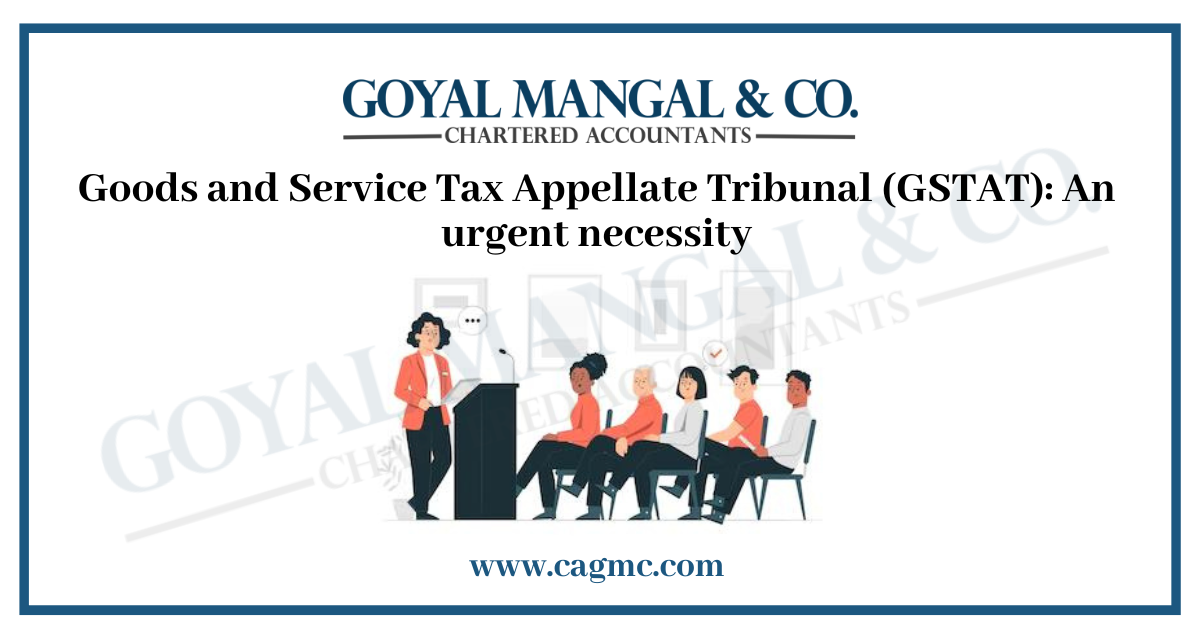 GST has introduced five years ago. Ever since there was seen an effective change in the system of taxation. With the introduction of GST, a new tax regime was inaugurated which bought a lot of difficulty and challenges for the citizens in understanding its concept and also in finding the appropriate forum in which people can raise their issues.
GST has introduced five years ago. Ever since there was seen an effective change in the system of taxation. With the introduction of GST, a new tax regime was inaugurated which bought a lot of difficulty and challenges for the citizens in understanding its concept and also in finding the appropriate forum in which people can raise their issues.
The country is yet to have “A Tribunal” an Appellate Authority. However, Article 323-B of the Constitution provides the resolution of disputes regarding the assessment, levy, enforcement, and collection of any tax.
These powers are also vested under Section 110 of the CGST Act 2017. Lately, several issues have been raised which show that it is essential that GST tribunals begin functioning soon and an adequate number of tribunal benches are set up timely.
|
Table of Content |
Abstract
India has seen development in the taxation system since the introduction of GST. Goods and Services Tax (GST) is an Indirect tax system that was introduced to replace a group of other Indirect taxes. GST replaced indirect taxes such as service tax, value added tax (VAT), excise duty, purchase tax and etc. Goods and Services Tax is levied in India on the supply of certain services and certain goods. It is the tax that is applicable all over the country.
However, with such, a newly introduced system of taxation, the business entities, and others affected started to feel the requirement for GSTAT.
This requirement was based on several factors such as;
- To fasten the process of the disposal of cases,
- Taxpayers who want to appeal against the orders of the appellate/revisional authorities have to approach the respective High Courts,
- Delay in trials because of no specific appellate tribunal and etc.
Meaning of Tribunal
A Tribunal is a part of the litigation System and works as an independent body. It is constituted to address and solve the issues of the Taxpayers. These independent bodies take the disputes which specifically refer to the subject matter because of which they are constituted.
Tribunal work to reduce the caseload of regular courts. Administrative Tribunals, State Administrative Tribunal, CAT (Central Administrative Tribunal), Water Disputes Tribunal, and (AFT) Armed Forces Tribunal are some examples of such tribunals. They take up the specific nature of matters.
Provision
Article 323B of the Constitution of India provides the establishment of a Tribunal. They are quasi-judicial authorities that are established to deal with problems. These problems include resolving tax-related or administrative disputes.
Functions
A Tribunal performs a number of functions such as determining rights between contesting parties, adjudicating disputes, tax litigations, making an administrative decision, reviewing an existing administrative decision, etc.
History of Tribunals
Tribunals were not a part of the Constitution of India originally. It was incorporated by the 42nd Amendment Act in the year 1976. Two Articles were incorporated to deal with the matters;
- Article 323A– This Article deals with Administrative Tribunals, and
- Article 323B– This Article deals with tribunals for other miscellaneous matters
Article 323B provides the establishment of tribunals to adjudicate disputes relating to matters including Taxation.
Pre GST Regime
The procedures to deal with several factors of the Tribunals have evolved over the years. This experience will help in establishing a tribunal that can resolve GST-related matters and litigations.
The Customs Excise and Service Tax Appellate Tribunal (CESTAT) played an important role under the pre-GST regime when it comes to disposing of litigation relating to Indirect Tax.
Apart from CESTAT, the (ITAT) Income-tax Appellate Tribunal also functions to resolve disputes relating to Direct taxes. This periodically continues under the GST regime too.
CESTAT
The taxpayers have the redressal system by taking their disputes to CESTAT, which is Customs, Excise, and Service Tax Appellate Tribunal. CESTAT works in the area of custom challenges and taxation systems.
It was created to provide an independent forum for hearing appeals against the orders which are passed by the officials of Service Tax Customs and Excise under;
- Customs Act, 1962,
- Central Excise Act, 1944, and
- Finance Act 1994
This Tribunal also has the power to hear the appeals against orders passed by the Authority under the Customs Tariff Act, 1975 in Anti-Dumping Duties.
Need for GSTAT
While GST system has recently completed five years. It has witnessed a lot of serious issues which were left unsatisfactorily resolved. From the constitutionality of certain GST provisions to transitional provisions, taxpayers felt aggrieved as they felt their issues were not resolved properly. Although the Government is taking several steps to address the concerns of the industry and reduce unnecessary litigation, the urgent need for the establishment of the GSTAT (Goods and Service Tax Appellate Tribunal) remain unsettled even today.
Currently, the majority of disputes are stuck at the First Appellate level. Most of these resolutions have to move to the respective High Courts. However, there is a lot of reluctance considering the cost and time involved.
There is a huge rise in litigation due to the gap in self-assessment and the interpretational issues of tax liabilities. It is due to a lack of understanding of the concept and law. There is a huge backlog of cases because a GSTAT has not been established and this backlog is only increasing substantially.
Challenges
In several disputes, the Appellate authorities rejected the export refund claims, because of which taxpayers were left with no legal remedies. The absence of a GST Appellate Tribunal could help against such adverse orders and the taxpayers would be working without having their huge working capital blocked.
This ultimately leads to a financial burden. It can be assumed that when the refund would be granted the taxpayers can borrow it from the lenders otherwise the cost of capital will become high as it can likely result in other tussles such as obtaining the interest at 6% on a refund that is delayed.
Concern Issues
One of the major concerns for the taxpayers is the interest accrual on the amounts that are litigated. If the formation of GSTAT is delayed, it will consequently expose them to heavy interest liabilities, which can go up to 18% on the dues. This is much higher than the lending rate of the prevailing bank.
Fully Functional GSTAT
If a GSTAT gets established by the year 2023, the best case scenario would be that the interest liability would be more than 100% of the tax liability (approximately).
This would be for the demands pertaining to the initial year of its inception, i.e., the Financial Year (FY) 2017-18.
The challenges are not limited to contrary appeal orders but are also faced where the First Appellate authority rules the decisions that are favorable to taxpayers, the Revenue may delay the implementation. This implementation will be on the grounds of the taxpayer’s intention for consequent litigation on the matter at the continuing appellate level. It sparks never-ending litigation.
Case Law
In the case of Zones Corporate Solutions Pvt. Ltd. Vs Commissioner of Central Goods and Services Tax Delhi East and Another:
Hon’ble Delhi High Court took cognizance of this issue and held that to contest (for the respondents) the order of the Commissioner of Appeals taxpayers cannot be asked to endlessly wait.
Issues with Alternative Remedies
There are alternative remedies available to handle the issues such as;
- Filing a writ petition with the Hon’ble High Courts,
- Resolving issues with the other tribunals such as CESTAT and etc.
But this is also a reality that these courts of law generally oppose entertaining writs that raise disputes regarding questions of fact and only focus on disputes regarding questions of law.
Therefore it is only a formulation of a specific Tribunal for the issues arising at the appellate level of GST matters. So that the issues are dealt as a fact analyzing level by the authority. In the absence of the GST Appellate Tribunal, most of such issues at the stage of litigation require the involvement of factual disputes.
47th GST Council Meet
Recently, the 47th GST Council meet was held in mid of June 2022. In this meeting, a Group of Ministers was constituted with six-member in it. This Group of Ministers (GoM) was headed by the deputy chief minister of Haryana, Mr. Dushyant Chautala.
He addressed various concerns that were raised by several States regarding the constitution of GSTAT. This GoM presented the framework and cleared that they have finalized the setting up of appellate tribunals that would take cognizance of disputes. This GoM stated that they would submit their report to the GST Council on which the council would take recommendations in their meeting at Madurai in the month of September 2022.
Recommendations by GoM
Some of the recommendations of the GoM include;
- The proposal to set up the principal bench of GSTAT in New Delhi,
- Up to Five benches of GST tribunal for the large states,
- That the appellate body should be headed by a Supreme Court judge from the Supreme Court or a Chief Justice of any High Court,
- Relaxation for the 25 years’ experience criteria for the appointment of technical members (as per the draft of the Council),
- To allow more than one bench in the states, based on population,
- An amendment of Section 110 in the CGST Act, 2017,
- That the appellate bodies must be set up in Union Territories and states, etc.
Way Forward
Under the GST regime, the procedure of the first appeal happens through individual officers but the procedure of the second appeal against the orders passed by the first appellate authority under State tax administration as well as Central tax administration with the GST Appellate Tribunal.
Therefore, this is the initial forum that connects the adjudication process of all the GST laws and all the tax administrations. The business entities have constantly felt the absence of a proper mechanism for appellate hearings and cognizance of matters. That is why, if GSTAT is established, taxpayers that are aggrieved by the orders would be able to approach GSTAT rather than having to approach the High Courts of their respective jurisdictions.
Conclusion
It is said that Justice delayed is Justice denied. Hence, to reduce the issues of the business, it is required that a GST Appellate Tribunal is set up as a top priority.
And if such setting up is delayed there will be a rise in the concerns and issues which will further make it difficult for the authorities to resolve in a timely manner. Such delay can collapse the system if citizens continue to feel aggrieved.


